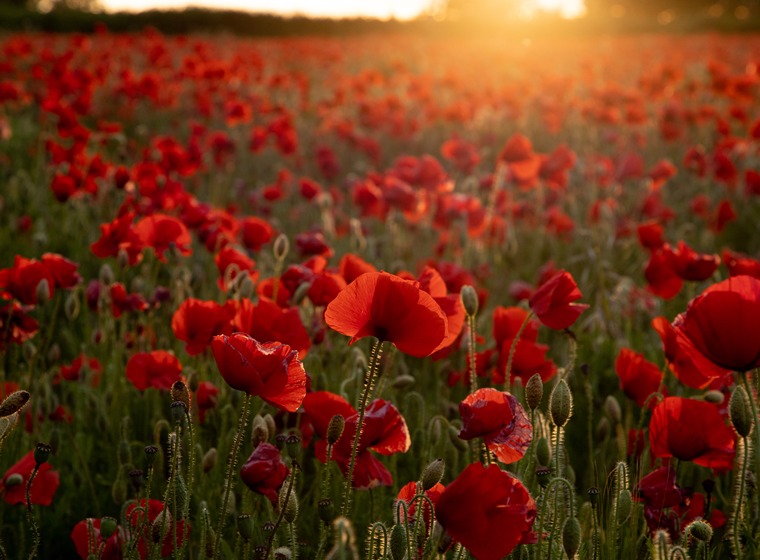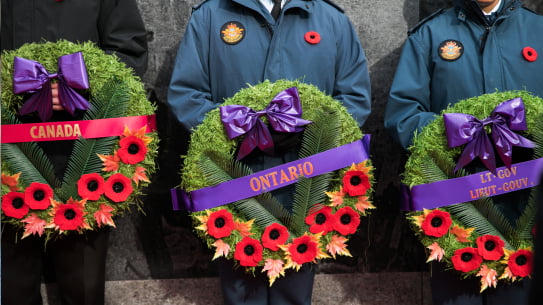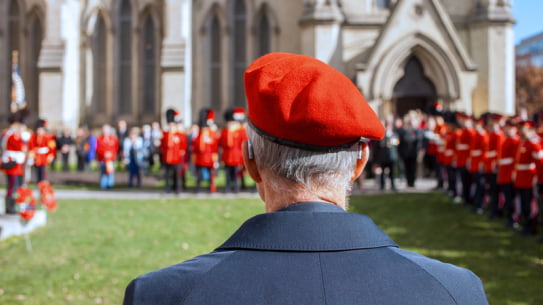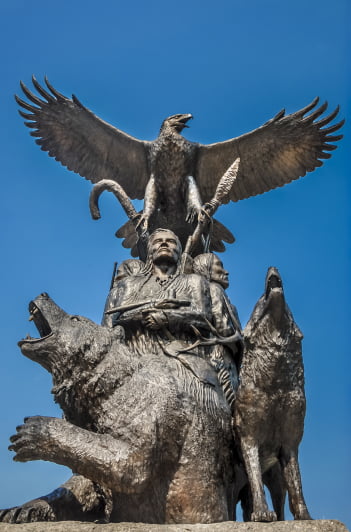Overview
Remembrance Day and Veterans’ Week is a time to respect, reflect and remember. It is a time to honour the fallen, reflect on the impact of armed conflict, and pay tribute to those who have served and continue to serve our country.
On November 11, observe two minutes of silence to show gratitude for the courage and sacrifice of our veterans and those currently serving in the Canadian Armed Forces.
Special dates
- Remembrance Day and Veterans’ Week (Ontario): November 5 to 11
- Indigenous Veterans Day: November 8
- Remembrance Day: November 11
Ways to remember
From November 5 to 11, we encourage you to commemorate Remembrance Day and Veterans’ Week in a way that is meaningful to you.
This might include:
- wearing a poppy
- observing a two-minute silence on November 11
- attending the ceremony at Queen’s Park
- attending a Remembrance Day event in your community
- visiting a memorial or war cemetery
- learning about those who served, including women, Indigenous people, Black Canadians, Chinese Canadians and Jewish Canadians
Two-minute silence
At 11 a.m. on November 11, pause and observe two minutes of silence in honour of those who died serving their country in wars and in peacekeeping efforts.
Ways to observe:
- sit or stand still
- if driving, pull over and sit quietly, if it is safe to do so
- announce the silence over the PA system in a business or school
- gather in common areas of an establishment
- briefly shut down assembly lines
Indigenous veterans
Indigenous Veterans Day is observed on November 8, to recognize the courage and sacrifice of First Nation, Inuit and Métis people in military service.
It is estimated that, in total, over 12,000 Indigenous people have volunteered their services on the front lines, serving in all conflicts that Canada has been involved in.
The First Nations, Inuit and Métis have a long and proud tradition of military service to Canada, which continues today with Indigenous people serving in Canadian Armed Forces around the world — from NATO duties in Europe to United Nations peace operations.
On the home front, Indigenous people donated large amounts of money, clothing and food to worthy causes. Indigenous women had important roles during conflicts — serving as nurses, air traffic controllers and radio operators.
On Indigenous Veterans Day, we honour the important contributions of Indigenous peoples to protect rights and freedom in Canada, and we remember those who lost their lives for our country and those whose lives were forever changed.
Learn more about Indigenous veterans.
Ceremonies
Queen’s Park
You’re invited to attend our in-person ceremony to honour veterans and active service members.
Date: November 11, 2025
Time: 10:45 a.m.
Location: In front of the Ontario Legislative Building
111 Wellesley Street West, Toronto, Ontario
You may also watch the ceremony live on YouTube.
Wreaths
- The Army, Navy and Air Force Veterans in Canada (ANAVETS Ontario Command)
- Archives of Ontario
- Consulate General of Republic of Angola
- Consulate General of Bahamas
- Consulate General of Barbados
- Consulate General of Belgium
- Consulate General of Brazil
- Consulate General of Bulgaria
- Consulate General of the Republic of Croatia
- Consulate General of Czech Republic
- Consulate General of Denmark
- Consulate General of the Dominican Republic
- Consulate General of France
- Consulate General of Germany
- Consulate General of Greece
- Consulate General of the Republic of Guatemala
- Consulate General of Hungary
- Consulate General of Indonesia
- Consulate General of Israel
- Consulate General of Italy
- Consulate General of Japan
- Consulate General of South Korea
- Consulate General of Kosovo
- Consulate General of Malta
- Consulate General of the Netherlands
- Consulate General of Panama
- Consulate General of the Philippines
- Consulate General of Romania
- Consulate General of Serbia
- Consulate General of Sweden
- Consulate General of Türkiye
- Consulate General of Ukraine
- Consulate General of the United Kingdom
- Consulate General of United States of America
- Honorary Consulate of Lebanon
- Historica Canada
- Malayan Volunteers Group
- Métis Nation of Ontario
- Métis Nation of Ontario Veterans’ Council
- Naval Club of Toronto
- NATO Association of Canada
- Ontario Association of Fire Chiefs
- Ontario Provincial Police Association
- Ontario Provincial Police
- Ontario Paramedic Association
- Ontario Teachers' Federation
- Ontario Society of Occupational Therapists
- Ornge
- Ontario Association of Portuguese Veterans
- Royal Canadian Military Institute
- Soldiers' Aid Commission
- St John Ambulance
- Royal Commonwealth Society
- The Salvation Army
- The Canadian Nursing Sisters Association, Toronto Branch
- Toronto Fire Services
- Toronto Professional Firefighters Association
- Toronto Police Association
- Toronto Paramedic Services
- True Patriot Love Foundation
- The Family of RSM George McKiel
- United Empire Loyalists' Association of Canada
- Veteran Affairs Canada
With sincere thanks to
- Legislative Assembly of Ontario
- Regional Cadet Support Unit (Central), Canadian Armed Forces
- Royal Canadian Legion, Ontario Command
- The soldiers, sailors and aircrew of 4th Canadian Division/Joint Task Force (Central), Canadian Armed Forces
- Toronto Paramedic Services
- Toronto Police Service
- Toronto Transit Commission
- Valour Canada
Local ceremonies
Visit your municipality’s website to find out if they’re hosting a ceremony near you.
You may also find Remembrance Day services at schools, colleges, universities, places of worship, your local veterans’ organization or through The Royal Canadian Legion.



